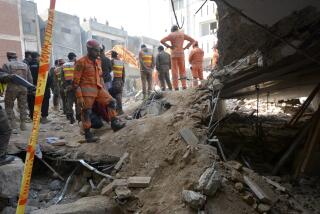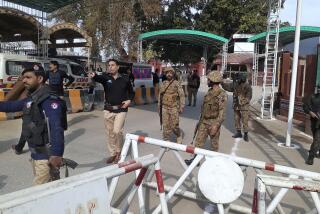Terrorist siege quelled in Mumbai
- Share via
MUMBAI, INDIA, AND BOSTON — Mumbai’s nightmare ended early today, nearly 60 hours after the start of a terrorist attack that left South Asia’s financial capital deeply shaken and resulted in the deaths of at least 150 people, including four Americans.
As the focus shifted to identifying the dead and determining who was behind this body blow to India’s psyche, busloads of commandos swarmed into the massive Taj Mahal Palace & Tower hotel, the militants’ last holdout, to mop up, search for injured guests and ensure that no booby traps had been left behind.
As word spread that the worst was over, the city’s residents and visitors finally exhaled after days of disbelief and shock as its local icons turned into bloody wreckage.
Shop owners considered reopening after days of lockdown, clumps of bystanders gathered to share the news, and the usual noise and bustle slowly returned.
“I’m overwhelmed with emotion that it’s finally over,” said Keki Dadiseth, who escaped from the Taj with 35 colleagues midway through the siege after breaking a window and descending a fire ladder. “It’s an enormous relief.”
In an impromptu news conference outside the Taj, J.K. Dutt, director of the National Security Guards, said three terrorists and a police commando had been killed in the final assault this morning and that police had started fires at the end to smoke out the militants.
Even as the government came under growing criticism for its slow response, Foreign Minister Pranab Mukherjee stepped up accusations against unnamed interests in Pakistan, India’s neighbor and longtime rival, following less direct allegations made by the prime minister a day earlier.
“Preliminary evidence, prima facie evidence, indicates elements with links to Pakistan are involved,” Mukherjee told reporters in New Delhi.
Pakistan countered that it was not to blame. The new government of President Asif Ali Zardari has worked hard to reduce tensions between the two adversaries. But some fear that the devastating attack could push relations back into a deep freeze, achieving what the perpetrators may have wanted.
British authorities said they were investigating reports that some of the suspects were British or had ties to Britain.
Prime Minister Gordon Brown and his foreign minister said Friday that it was too early to draw conclusions about possible involvement of British citizens.
Sources familiar with the Indian investigation said the focus is largely on the Pakistani Islamist militant group Lashkar-e-Taiba.
A U.S. counter-terrorism official confirmed that the Indian investigation has information that points to Pakistani-based militant groups that have long been launching terrorist attacks against the Indian government over the disputed territories of Jammu and Kashmir, and specifically to Lashkar-e-Taiba.
“Some of the things that have been learned are certainly consistent with an LET [Lashkar-e-Taiba] role. It is being looked at, and looked at hard,” said the U.S. counter-terrorism official, who spoke on condition of anonymity because he was not authorized to discuss the Indian-led investigation, results of which have been shared with U.S. authorities. The official declined to provide details.
A Western diplomat familiar with the investigation said officials were startled by the military precision of the attacks. At least some of the gunmen appeared to be receiving some kind of instructions from a command center where others were coordinating the overall operation, the diplomat said.
The siege started Wednesday evening when disciplined teams of heavily armed young militants, who reportedly landed in speedboats, fanned out across the city and attacked 10 targets, including two luxury hotels, a restaurant popular with tourists, a train station, two hospitals and a Jewish center.
Despite stepped-up security across Mumbai by police, firefighters, and army and navy commandos, fighting continued throughout the day Friday. Two suspected terrorists were killed and more than 140 hostages freed at one of the five-star hotels, the Oberoi.
But explosions continued into this morning at the Taj Mahal Palace & Tower.
Hours earlier, violence had ended at the ultra-Orthodox Chabad-Lubavitch Jewish Center about half a mile away, and news spread that all five hostages had died, including American Rabbi Gavriel Noach Holtzberg and his wife, Rivkah.
“The worst fears of the last 48 hours seemed to have happened,” said Jonathan Solomon, chairman of the Indian Jewish Federation.
The couple’s toddler son Moshe survived the assault after an employee sneaked him out. He is now with his grandparents.
The choice of the community center as a target highlighted the attacker’s meticulous planning, given that many people in the neighborhood didn’t know it existed. It also underscored the vulnerability of about 3,300 Chabad-Lubavitch centers worldwide at a time when terrorists are seeking out soft targets, said Anshel Pfeffer, correspondent with Israel’s Haaretz newspaper.
In addition to the rabbi and his wife, an American and his teenage daughter traveling with a spiritual group were also among those killed during the coordinated attacks.
A spokeswoman for the Faber, Va.-based Synchronicity Foundation identified its two slain members as Alan Scherr, 58, and his 13-year-old daughter, Naomi.
Even as many Indians directed their anger and shock at Pakistan, with the militant group Lashkar-e-Taiba frequently mentioned, some observers questioned the jump to judgment.
“What concerns me is really the haste with which India points the finger at Pakistan,” said Nasim Zehra, an independent defense analyst and Harvard fellow based in Islamabad, the Pakistani capital. “Even if it turns out there is an international dimension, I would’ve thought they would follow a proper investigation.”
Analysts also cited the importance of distinguishing between the Pakistani government and rogue elements. A previously unknown group calling itself the Deccan Mujahedin, apparently Muslim militants, has claimed responsibility for the attacks, but experts say the claim may be false.
A captured suspect undergoing intensive interrogation about the plot was believed to be from the Punjab region of Pakistan near the border with India, where Lashkar, which has been officially banned by the Pakistani government, has been headquartered.
For years, Lashkar has said that its goal is to destroy the Indian state and create a Muslim superstate in South Asia that would unite the region’s disparate Islamic communities, said Bruce Riedel, a former South Asia intelligence analyst at the CIA and National Security Council.
Analysts say Lashkar runs numerous paramilitary camps in Pakistan that have trained thousands of foot soldiers, and that it operates an empire of schools and charities under the front group Jamaat-ud Dawa.
Evidence emerged Friday that Al Qaeda did not have a lead role in the attack. A videotaped message by Ayman Zawahiri, Al Qaeda’s No. 2 leader, made no mention of the attacks and focused mainly on the Middle East.
One theory under investigation is that the gunmen came from the teeming Pakistani port city of Karachi on some sort of mother ship, then hijacked fishing boats and inflatable dinghys in India’s Gujarat state and used them to get to shore in Mumbai.
They were also believed to be working with Indian militants, especially during months of surveillance, intelligence-gathering and planning that is now believed to have been key to the assaults’ success.
Indian authorities said that six or seven attackers were killed Thursday and at least five on Friday but that some of the attackers were believed to have escaped.
The State Department issued an advisory for Americans not to travel to Mumbai, at least through the end of this month. It also set up a call center at (888) 407-4747 for Americans concerned about family who may be in Mumbai.
--
josh.meyer@latimes.com
Times staff writer Sebastian Rotella in Madrid contributed to the report.
--
Mark Magnier reporting from Mumbai, India
Josh Meyer reporting from Boston
More to Read
Sign up for Essential California
The most important California stories and recommendations in your inbox every morning.
You may occasionally receive promotional content from the Los Angeles Times.










